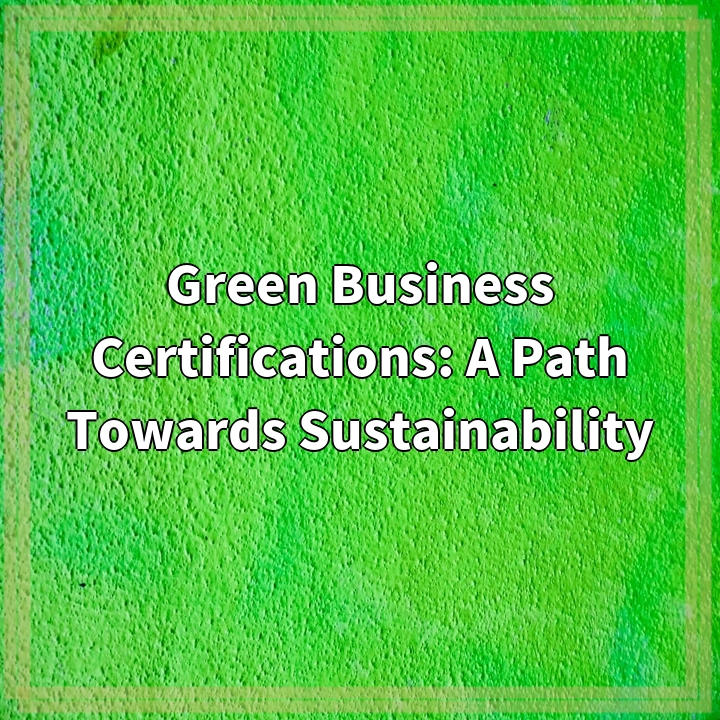
What is Green Business Certification?
Green Business Certification is a voluntary program that assesses and recognizes businesses that meet certain environmental criteria. It is designed to encourage and incentivize sustainable practices in various aspects of business operations, including energy and resource use, waste management, water conservation, and social responsibility.
Real-World Problems Associated with Green Business Certification
Lack of Standardization
One of the challenges in the Green Business Certification landscape is the lack of standardization. There are several different certification programs available, each with its own criteria and assessment process. This can create confusion for businesses and consumers alike, as it becomes difficult to compare and evaluate the sustainability performance of different certified businesses.
Greenwashing
Another issue that arises with Green Business Certification is the problem of greenwashing. Greenwashing refers to the practice of misleadingly presenting a business as being more sustainable or environmentally friendly than it actually is. Some businesses may seek certification without making substantial changes to their practices, simply to gain a marketing advantage. This undermines the credibility of the certification process and makes it harder for consumers to distinguish between genuinely sustainable businesses and those simply trying to appear eco-friendly for marketing purposes.
Business Size and Resources
Green Business Certification can also be challenging for small businesses with limited resources. Implementing sustainable practices may require an upfront investment in equipment, technology, or employee training. Small businesses may struggle to allocate the necessary funds and time to meet the certification criteria, which can put them at a disadvantage compared to larger corporations with more financial resources.
Limited Scope
While Green Business Certification programs cover a wide range of environmental and social sustainability aspects, they may not address all relevant issues. For example, certain certifications may focus more on energy efficiency and waste reduction but pay less attention to issues such as biodiversity conservation or supply chain sustainability. This limited scope may fail to capture the holistic sustainability efforts of some businesses and overlook important environmental and social impacts.
Continuous Improvement
A further challenge for businesses certified under Green Business Certification programs is the need for continuous improvement. Sustainability is an ongoing journey, and businesses must continuously strive to improve their practices to meet evolving environmental standards. This can be demanding for businesses, particularly those in resource-intensive industries, as they must perpetually invest time, effort, and financial resources to maintain their certification status.

Solutions to Green Business Certification Challenges
Standardization and Transparency
To address the lack of standardization, efforts can be made to establish common guidelines and criteria for Green Business Certification programs. Collaboration between certification bodies can help create a more consistent and transparent framework, allowing businesses and consumers to more easily compare and trust certified businesses. This could include the development of industry-wide standards and certifications that encompass a broader range of sustainability aspects.
Enhanced Verification and Audit Processes
To combat greenwashing, certification bodies can implement stricter verification and audit processes. Regular checks and evaluations can ensure that businesses are genuinely meeting the required sustainability criteria and that they are committed to ongoing improvements. Increased transparency in reporting and independent third-party auditing can help build trust in the certification process and reduce the prevalence of misleading claims.
Support for Small Businesses
To assist small businesses in achieving certification, initiatives can be developed to provide financial and technical support. This may include financial incentives, grants, or low-interest loans to offset the costs of implementing sustainable practices. Additionally, educational programs and resources can be made available to help small businesses understand the certification process and identify cost-effective sustainability measures.
Comprehensive Sustainability Frameworks
Expanding the scope of Green Business Certification programs to cover a wider range of environmental and social sustainability issues would ensure a more holistic assessment. This could involve working with stakeholders to develop comprehensive sustainability frameworks that address areas such as biodiversity conservation, carbon neutrality, supply chain transparency, and social equity. This approach would provide a more comprehensive view of a company’s overall sustainability performance.
Recognition of Continuous Improvement
Instead of solely focusing on achieving certification, there can be a greater emphasis on recognizing and rewarding continuous improvement. Certification bodies could introduce tiered certifications or renewal requirements that encourage businesses to demonstrate progress over time. This would incentivize businesses to continually invest in sustainability and maintain their commitment to ongoing improvements.















